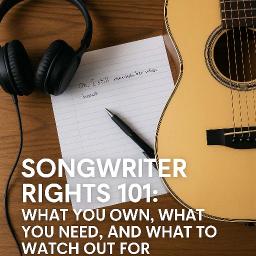Songwriter Rights 101: What You Own, What You Need, and What to Watch Out For

For new songwriters, including AI creators using tools like Suno
If you’ve recently started writing songs—whether with a notebook, a DAW, or AI platforms like Suno—you’re stepping into the role of a songwriter. And with that comes a world of creative opportunity, and a set of important rights and responsibilities. Understanding how copyright, publishing, licensing, and royalties work is essential if you want to protect and profit from your songs.
This guide is a starting point.
1. What Rights Do You Have as a Songwriter?
When you write a song (the lyrics and melody, regardless of how they’re created), you automatically own the copyright to that composition the moment it's fixed in a tangible form—written, recorded, or saved digitally.
You hold two primary types of rights:
-
Composition rights (lyrics and melody)
-
Sound recording rights (the actual recorded performance)
If you create both the song and the recording, you hold both rights unless you’ve assigned them away (for example, to a label or publisher).
2. Cover Songs: What You Can Do Legally
If you're performing and recording a song written by someone else, you're creating a cover. And good news: you can release cover songs without asking permission.
That’s thanks to a U.S. law called the compulsory mechanical license, which allows anyone to cover a song after it’s been released publicly—as long as you don't change the lyrics or melody, and you:
-
Obtain a mechanical license
-
Pay mechanical royalties to the copyright owner
You can get this license easily through services like:
-
The Harry Fox Agency
-
Songfile (by HFA)
-
Easy Song Licensing
This license applies to audio-only formats: Spotify, CDs, downloads, Bandcamp, etc.
⚠️ Cover Songs and YouTube: Important Distinction
There’s a key difference between uploading a cover song as audio via a distributor and uploading a video of a cover to YouTube yourself:
| Upload Method | License Required | Are You Covered? |
|---|---|---|
| Upload via DistroKid to YouTube Music (audio only) | Mechanical license | ✅ Yes — distributor handles it |
| Upload as a video to YouTube.com (with visuals) | Sync license | ⚠️ No — not automatically licensed |
Uploading a cover to YouTube Music via DistroKid is safe:
-
DistroKid secures the mechanical license.
-
Royalties are handled automatically.
-
You’re fully cleared for audio streaming.
Uploading a cover as a video on YouTube.com, however, is a visual pairing—this requires a synchronization (sync) license, which you must negotiate directly with the rights holder.
While many videos stay up due to YouTube’s Content ID system (and may be monetized by the rights owner), this doesn’t mean you’re fully in the clear legally. The publisher could still issue a takedown.
3. PROs – What They Do and Why You Should Join One
Performing Rights Organizations (PROs) collect money on your behalf when your song is performed publicly—on radio, live in venues, on TV, or even in restaurants.
In the U.S., the main PROs are:
-
ASCAP
-
BMI
-
SESAC (invite-only)
-
GMR (Global Music Rights)
You only need to sign up with one, and registration is free (or very low-cost). Once you join:
-
Register each of your songs
-
Submit setlists for live performances (yes, even your own gigs!)
-
Collect royalties every time your song is publicly performed
Even if you use Suno or another AI tool to write your music, if you own the final lyrics and melody, you are eligible to collect royalties through a PRO.
4. Licensing: More Ways Songs Generate Revenue
Your songs can make money in several different ways. Each type of use may require a different kind of license:
| Type of Use | License Needed | Who Pays You |
|---|---|---|
| Streaming (Spotify, Apple Music) | Mechanical + performance | Distributors + PROs |
| Covers (audio only) | Mechanical (compulsory) | Covered by license fees |
| Video (YouTube, TV, film) | Sync license | Direct negotiation |
| Radio play | Performance | PROs |
| Live shows (your songs) | Performance | PROs |
| Video games / Ads / Film | Sync license | You negotiate or go through a sync agent |
Sync licenses are not automatic. You must grant permission or work through a licensing agency that does.
5. Copyright: The Foundation of All Rights
Copyright is automatic, but registering your songs with the U.S. Copyright Office gives you stronger protection in court if someone uses your work without permission.
-
Register online at copyright.gov
-
You can batch-register multiple songs at once
-
Registration gives you legal leverage for damages if someone infringes on your work
Even if you’re creating songs with AI tools, if the output is yours under the platform’s terms (as with Suno, Udio, etc.), you can register it.
6. What About AI Platforms Like Suno?
AI tools like Suno are opening the door for poets, lyricists, and non-traditional musicians to participate in songwriting in new ways. But there’s often confusion around what you actually own.
With Suno, their Terms of Service (as of now) state:
-
You own the rights to the output you generate, including the music and lyrics
-
You can use it commercially
-
You are responsible for ensuring it doesn’t infringe on others’ copyrights
So if you generate a track on Suno, you’re the copyright holder—just like if you wrote it on a piano. You can:
-
Register the song with a PRO
-
Distribute it through music platforms
-
License it for use in video or media
But be careful:
-
If Suno’s output resembles an existing song (accidentally or due to training data), you might be at risk for copyright issues.
-
Always review and modify outputs for originality if you plan to release them commercially.
Final Takeaways
-
✅ You own your songs the moment you write them (or generate them via Suno, if within TOS).
-
✅ You can legally release cover songs using a compulsory mechanical license.
-
⚠️ For videos using music, you need a sync license—even for covers.
-
✅ Join a PRO like ASCAP or BMI to collect royalties for public use.
-
✅ Consider registering your songs with the U.S. Copyright Office for added legal protection.
-
✅ Treat AI outputs as your property, but use common sense and legal caution before releasing or licensing widely.
Songwriter Circuit is here to help you navigate these steps, connect with others in your shoes, and build a future where songwriters—of all backgrounds and tools—own their voices and share them with the world.
Tags




